ABU DHABI // Illegal drug users are turning from heroin and other opiates to prescription drugs and medication, particularly tramadol, rehabilitation experts have warned.
Prescription drug use has been on the rise for the past 10 years, Dr Hamad Al Ghaferi, director general of the National Rehabilitation Centre, told the Global Forum for Youth Leaders on Drug Use Prevention.
“We as patients, we as human beings, don’t know how to ask for help,” Dr Al Ghaferi said of addicts.
The centre is working with police and the Ministry of Health to regulate prescription drug purchases. A system is in place but in its early stages.
“This system will make sure that any prescribed drugs are being controlled and monitored,” said Dr Ali Al Marzooqi, the centre’s director of public health and research.
Tramadol, a painkiller similar to opiates such as morphine, makes users feel relaxed, but it is easy to overdose, causing respiratory arrest or death, Dr Al Marzooqi said.
NRC patients who abuse prescription medication often combine them with other drugs, he said.
About 1,000 patients were admitted to NRC outpatient clinics last year, and Dr Al Marzooqi described the increase in the number of young people using drugs as “alarming”, with those admitted as young as 12.
Asma Yaaqoub, 25, a conference volunteer, said many young people had misconceptions about drugs, and she had acquaintances who had travelled to Europe or the US to try marijuana.
“They think it’s healthy,” she said.
Ms Yaaqoub, from Abu Dhabi, said she had attended to learn more about drug use to answer her own questions after having such conversations with friends.
“I want the Government and police to catch young people who are doing these drugs because this is affecting society,” she said.
Ahmed Fawzy, from Cairo, said young people should be given more accurate and honest messages about the dangers of different substances.
“You shouldn’t just lump everything together in one and hope to stop it because it’s all bad – no, tell me exactly how it’s bad,” said Mr Fawzy, 22, who has produced educational videos for a non-profit organisation.
He said young people were rebellious and may feel all information they were given about drugs was false if they were given blanket statements such as “drugs kill”.
“It’s all about credibility,” he said.
The NRC organised the conference with the Colombo Plan, an organisation working on economic and social development issues in Asia and the Pacific, including drug-use prevention.
Speakers included officials from the US Department of State, the UN and non-profit organisations.
About 400 people from 46 countries attended. Another 180 came from UAE health authorities, universities and other official bodies such as the police.
The forum included workshops and trainings, and an opening ceremony on Monday featured a dance performance depicting drug addicts being saved by community role models and their own inner faith.
Questions posed to the forum included “Why is drug use increasing in the world?” and “Why do young people take drugs?”
When asked by organisers if they thought it was possible to prevent young people from abusing drugs, only about 15 of several hundred in the audience raised their hands. Speakers said they hoped to increase that number during the conference.
The forum continues until Friday.
lcarroll@thenational.ae





